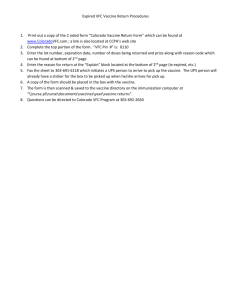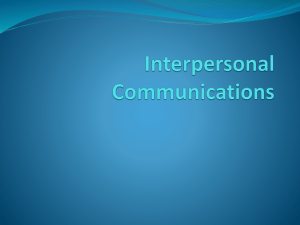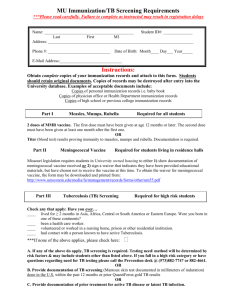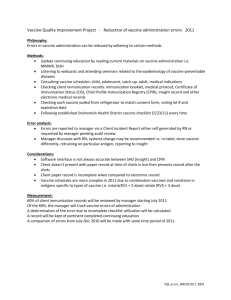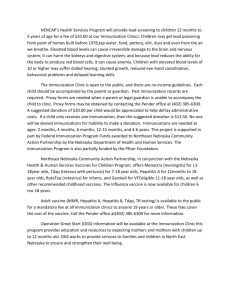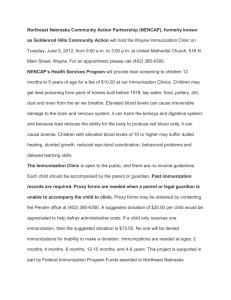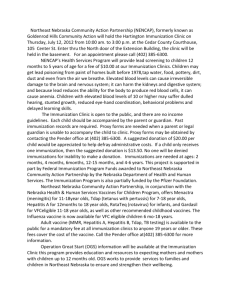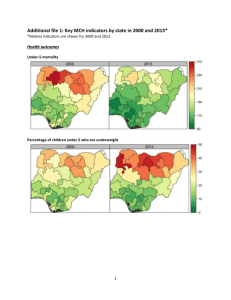mission statement - Association of Immunization Managers
advertisement
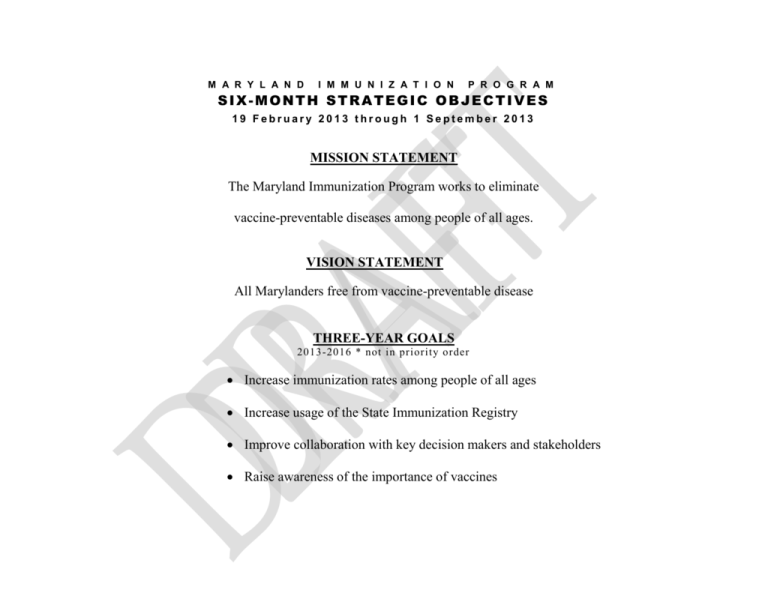
M A R Y L A N D I M M U N I Z A T I O N P R O G R A M SIX-MONTH STRATEGIC OBJECTIVES 19 February 2013 through 1 September 2013 MISSION STATEMENT The Maryland Immunization Program works to eliminate vaccine-preventable diseases among people of all ages. VISION STATEMENT All Marylanders free from vaccine-preventable disease THREE-YEAR GOALS 2013-2016 * not in priority order Increase immunization rates among people of all ages Increase usage of the State Immunization Registry Improve collaboration with key decision makers and stakeholders Raise awareness of the importance of vaccines S.W.O.T. ANALYSIS Strengths – Weaknesses - Opportunities - Threats STRENGTHS AND ACCOMPLISHMENTS OF IMMUNIZATION PROGRAMS IN MARYLAND Brainstormed List of Perceptions People (vaccinators) are really interested Leadership from the State Health Dept. Immunization policy is starting to change, show a lot of positive movement Nice collaboration and partnerships Nationally-known and respected immunization coalition The immunization community is well-regarded and recognized within the US; we receive recognition by others at national meetings Good partnerships with universities in Maryland Greg Reed, our manager, has been recognized with the highest honors among program managers Maryland was the first state to have a school-based flu initiative We’re able to respond quickly to vaccine-preventable disease outbreaks Strong political will; immunization is a priority of the State of Maryland Human resource coordinators are interested, dynamic and creative We have good providers in Vaccines for Children We have tech strength – local and state registries Very good education opportunities Good communication from state to the providers; State Health Dept. puts out different messages There are good low- and no-cost immunizations Maryland is built on partnerships We were number one in childhood immunizations a few years ago; we still perform above the national average Longest running HCP immunization initiative; we won an award for it We have good educational programs that we do nine times a year for VFC providers In a year, we distributed over 1 million vaccine doses to over 900 providers Center For Immunization 2 Feb- Sept 2013 CURRENT WEAKNESSES/CHALLENGES OF IMMUNIZATION PROGRAMS IN MARYLAND Brainstormed List of Perceptions Lack of use of Immunet Lack of pooling resources Turnover in provider offices Lack of full access to certain vaccines, e.g., pertussis Insufficient number of staff for VFC oversight Lack of education of community providers and staff Not keeping up with technology and trends Challenge of recruiting and retaining staff Lack of education regarding adult immunizations’ Lack of public information about the HPV vaccine Many, many administrative levels and there’s not enough agreement about how things should be done No funding from the State of Maryland; all CDC funds Challenge of keeping up with public health policy changes Not attracting new, young talent Lack of financial resources Lack of full registry reporting for all providers Lack of adult services Missed opportunities Lack of staff due to limited funding Lack of champions Underfunded public health programs Variation in LHD programs and services Center For Immunization 3 Feb- Sept 2013 EXTERNAL FACTORS/TRENDS THAT WILL/MIGHT HAVE A POSITIVE IMPACT ON IMMUNIZATION PROGRAMS IN MARYLAND IN THE NEXT THREE YEARS Brainstormed List of Perceptions Inclusion of new immunizations in the HEDIS specs/requirement Health care reform; preventive care is at the top of the list A lot of funding will be put into prevention as a result of the Affordable Care Act Providers are going to be assessed on their quality of care rather than the number of patients seen There will be a lot of peer pressure on the health care providers to focus on quality and to keep up with their peers Growth of new vaccines, e.g., longer lasting flu vaccine Development of a TB vaccine Increase in the number of vaccine providers Immigration policy Global health National incentive programs that offer incentives for use of electronic health records Increased vaccine requirements for health care workers and adolescents More collaboration among pharma Non-federal sources of funding Decrease in health disparities in Maryland More movement toward medical homes Better economy General awareness and stories in the media regarding immunizations Growth in adult immunization efforts; promotion by ACA Maryland’s Health Information Exchange Emerging and reemerging vaccine-preventable diseases Greater use of existing vaccines, e.g., shingles, HPV Improved collaboration among some of the professional providers Increased use of Immunet Convenience of receiving vaccines, e.g., in grocery stores Increased opportunities for funding, some out of the box, online approaches, etc. Potential to expand opportunities for FQHCs Focus on immunization by the various administrative levels in DHMH Increased use of electronic health records Legislation – some mandates have been positive Mandates for employment Increasing use of social media Center For Immunization 4 Feb- Sept 2013 EXTERNAL FACTORS/TRENDS THAT WILL/MIGHT HAVE A NEGATIVE IMPACT ON IMMUNIZATION PROGRAMS IN MARYLAND IN THE NEXT THREE YEARS Brainstormed List of Perceptions Anti-vaccine groups Fighting among providers Vaccine-hesitant parents Aging population Physicians who are hesitant to administer all the vaccines that are recommended Vaccine shortages Vaccine manufacturers are limited and there is fear that some may discontinue production of some vaccines due to low profits Biological terrorism Alternatives to care Increase in telemedicine Potential for philosophical exemptions Failure to keep up with technology by local health departments and providers Social stigma around HPV vaccine Allocation of immunization funds Improving economy; will make it difficult to attract good employees High cost of vaccines for private providers Increasing unfunded federal mandates Increasing unfunded state mandates Pertussis vaccine is not as good as it should be The Sequester Health care reform flooding the PCP network with the newly insured Cuts in some public health funding Lack of personnel to educate those coming for vaccines Shrinking provider network Public mistrust Competition for and confusion over where people are going for information Some information put out by the media is unqualified, e.g., efficacy of flu vaccines Novel diseases – vaccine-preventable diseases that we’re not ready for Center For Immunization 5 Feb- Sept 2013 THREE-YEAR GOAL: INCREASE IMMUNIZATION RATES AMONG PEOPLE OF ALL AGES Objective: 0101 Assure the affordability of the vaccine finance policy and update when budget, target populations, or vaccine recommendations change. PERFORMANCE MEASURE PES data submitted CAT submitted ACTIVITIES DESCRIPTION 1 2 3 4 Annually submit Population Estimates Survey (PES) and Cost and Affordability Tool (CAT) based on guidance from CDC. Annually obtain state-level Medicaid data and submit to CDC according to the prescribed timeline for inclusion into the PES. Review pre-populated data provided by CDC. Provide additional data or alternative data sources for consideration for inclusion in the PES, as needed and appropriate, including population data or other data based on CDC guidance for delegation of authority. VFC Chief Submit updated PES and/or CAT whenever a change in funding or a change in population served occurs. PES data submitted CAT submitted Review and analyze vaccine purchases monthly and compare doses ordered to provider level data, making changes to the PES and/or CAT as needed. Provide updated data for PES as necessary. PES data submitted CAT submitted PES data submitted CAT submitted Center For Immunization RESPONSIBLE INDIVIDUAL Vaccine Coordinator 6 Vaccine Coordinator VFC Chief Vaccine Coordinator VFC Chief Vaccine Coordinator VFC Chief TIMELINE Annually before the beginning of the federal fiscal year As needed Monthly As needed Feb- Sept 2013 THREE-YEAR GOAL: INCREASE IMMUNIZATION RATES AMONG PEOPLE OF ALL AGES Objective: 0102 Maintain up-to-date vaccine spend plan. PERFORMANCE RESPONSIBLE MEASURE INDIVIDUAL Percent of monthly updates Vaccine submitted by the CDCCoordinator requested deadline. -Target = 100% VFC Chief Percent of total vaccine budget (dollars) by vaccine by month for which missing spend plans exist. - Target = 0% ACTIVITIES DESCRIPTION TIMELINE 1 Review spend plan monitoring, replenishment, and missing spend plan reports on a monthly basis. 2 Review monthly spend plan update message sent by CDC Percent of monthly updates Vaccine submitted by the CDCCoordinator requested deadline. -Target = 100% VFC Chief Percent of total vaccine budget (dollars) by vaccine by month for which missing spend plans exist. - Target = 0% Monthly 3 Make necessary spend plan changes based on reports review and the guidance in the monthly spend plan update message Percent of monthly updates Vaccine submitted by the CDCCoordinator requested deadline. -Target = 100% VFC Chief Percent of total vaccine budget (dollars) by vaccine by month for which missing spend plans exist. - Target = 0% Monthly Center For Immunization 7 Monthly Feb- Sept 2013 THREE-YEAR GOAL: INCREASE IMMUNIZATION RATES AMONG PEOPLE OF ALL AGES 4 Correct missing spend plans before CDC’s month end closing process Percent of monthly updates Vaccine submitted by the CDCCoordinator requested deadline. -Target = 100% VFC Chief Percent of total vaccine budget (dollars) by vaccine by month for which missing spend plans exist. - Target = 0% Monthly 5 Participate in periodic conference calls or meetings regarding spend plan with Vaccine Advisor/Project Officer. Percent of monthly updates Vaccine submitted by the CDCCoordinator requested deadline. -Target = 100% VFC Chief Percent of total vaccine budget (dollars) by vaccine by month for which missing spend plans exist. - Target = 0% Monthly Center For Immunization 8 Feb- Sept 2013 THREE-YEAR GOAL: INCREASE IMMUNIZATION RATES AMONG PEOPLE OF ALL AGES Objective: 0103 Increase Adult Vaccination Rates ACTIVITIES DESCRIPTION PERFORMANCE MEASURES Meeting with adult immunization coalition Use of webinars and other educational tools RESPONSIBLE INDIVIDUAL Adult Imm. Coor. TIMELINE Mar 19, 2013 1 Establish a mechanism to educate providers and the public about adult vaccinations 2 Formalize a network of adult vaccination providers List of adult providers that serve uninsured and under-insured adults Adult Imm. Coor. April 1, 2013 3 Establish at least three non-traditional partnerships for vaccine delivery Development of RFP for the provision of vaccine and funding Informational meeting with RFP interested adult providers Adult Imm. Coor. May. 1, 2013 Center For Immunization 9 Feb- Sept 2013 THREE-YEAR GOAL: INCREASE IMMUNIZATION RATES AMONG PEOPLE OF ALL AGES Objective: 0104 Increase Adolescent Vaccination Rates ACTIVITIES DESCRIPTION 1 Establish a mechanism to educate providers, parents and youth about adolescent vaccinations 2 Establish at least three non-traditional partnerships for vaccine delivery PERFORMANCE MEASURES Meeting with childhood immunization coalition Use of webinars and other educational tools RESPONSIBLE INDIVIDUAL Health Educator Mar. 19, 2013 Development of RFP for the provision of vaccine and funding Informational meeting with RFP interested partners Health Educator May. 1, 2013 Meet with PHPA/DHMH social media coordinator Development of relevant/targeted messages for posting on social media Health Educator June 1, 2013 3 Expand the use of social media to increase awareness of adolescent vaccinations Center For Immunization 10 TIMELINE Feb- Sept 2013 THREE-YEAR GOAL: INCREASE IMMUNIZATION RATES AMONG PEOPLE OF ALL AGES Objective: 0105 Increase Childhood Vaccination Rates ACTIVITIES DESCRIPTION 1 Establish a mechanism to educate health care providers and parents 2 Expand the use of social media to increase awareness of childhood vaccinations PERFORMANCE MEASURES Meeting with childhood immunization coalition Use of webinars and other educational tools RESPONSIBLE INDIVIDUAL Health Educator Mar. 19, 2013 Health Educator June 1, 2013 Center For Immunization 11 Meet with PHPA/DHMH social media coordinator Development of relevant/targeted messages for posting on social media TIMELINE Feb- Sept 2013 THREE-YEAR GOAL: INCREASE IMMUNIZATION RATES AMONG PEOPLE OF ALL AGES Objective: 0106 1 2 3 Assure that VFC-enrolled providers comply with VFC program requirements through annual compliance site visits to at least 50% of active VFC-enrolled providers and other means as defined in the current VFC Operations Guide. PERFORMANCE RESPONSIBLE TIMELINE ACTIVITIES DESCRIPTION MEASURES INDIVIDUAL Conduct compliance visits to at least 50% of active Percentage of active VFC Chief Provider site VFC-enrolled providers annually, ensuring all active providers receiving VFC visits are providers receive a compliance site visit at least every compliance site visits VFC/AFIX Site scheduled at a other year. annually. Reviewer rate of 15 per VFC/AFIX Site Percentage of provider sites Reviewer per receiving a VFC compliance month site visit that are noncompliant for one or more high-priority questions on the VFC Site Visit Questionnaire. Conduct and document provider site education, corrective actions, and appropriate level of follow-up for all provider sites found to be non-compliant with program requirements during the VFC compliance site visit. Follow the Non-compliance with VFC Provider Requirement Protocol outlined in the VFC Operations Guide when defining the level of follow-up necessary to address and resolve issues of noncompliance. Percentage of provider sites receiving a VFC compliance site visit that are noncompliant for one or more high-priority questions on the VFC Site Visit Questionnaire. VFC Chief Develop and implement education and training for VFC-enrolled providers to ensure that the VFC Program is implemented according to federal guidance. Percentage of provider sites receiving a VFC education and training session Nurse Consultant/Healt h Educator Center For Immunization 12 VFC/AFIX Site Reviewer Provider site visits are scheduled at a rate of 15 per VFC/AFIX Site Reviewer per month As needed Feb- Sept 2013 THREE-YEAR GOAL: INCREASE IMMUNIZATION RATES AMONG PEOPLE OF ALL AGES 4 Provide annual training for staff conducting VFC compliance site visits with periodic updates as program requirements change. Scheduling and conducting of the annual VFC/AFIX Site Reviewer training retreat VFC Chief Sept. 1, 2013 5 Compare and use aggregate data collected from VFC compliance site visits and follow-up activities and the annual VFC Program Management Survey to improve the overall implementation of the VFC Program Development and implementation of new policies and trainings based on compliance visit data VFC Chief Ongoing Objective: 0107 Reduce or eliminate coverage disparities by race, ethnicity, and socioeconomic status. 1. PERFORMANCE MEASURES Activity implementation plan and proposed outcome-oriented performance measures submitted based on data results ACTIVITIES DESCRIPTION Use the best available data to identify coverage disparities by race, ethnicity, and socioeconomic status among children, adolescents, adults, and special populations. Center For Immunization 13 RESPONSIBLE INDIVIDUAL Sr. Epidemiologist TIMELINE Ongoing Feb- Sept 2013 THREE-YEAR GOAL: INCREASE IMMUNIZATION RATES AMONG PEOPLE OF ALL AGES Objective: 0108 1 Assure adherence to CDC’s Manual for the Surveillance of Vaccine-preventable Diseases including Vaccine Adverse Events Reporting in the conduct of vaccine-preventable disease surveillance and case investigation PERFORMANCE RESPONSBILE TIMELINE ACTIVITIES DESCRIPTION MEASURES INDIVIDUAL Sr. Ongoing Implement and maintain surveillance systems to Submission of Annual Epidemiologist investigate and document cases and outbreaks of Progress Report (Disease vaccine-preventable diseases (VPDs). Surveillance) Investigate cases that are reportable in Maryland, implement appropriate public health activities, and ensure that appropriate clinical specimens are tested and relevant epidemiologic information is collected for Congenital Rubella Syndrome (CRS), diphtheria, Haemophilus influenzae, measles, meningococcal disease, mumps, pertussis, polio, invasive pneumococcal disease, rubella, tetanus, pediatric (< 18 years of age) influenza deaths, hepatitis A, hepatitis B, and varicella. Center For Immunization 14 Feb- Sept 2013 THREE-YEAR GOAL: INCREASE IMMUNIZATION RATES AMONG PEOPLE OF ALL AGES Objective: 0109 Engage in ongoing evaluation of program activities based on CDC’s guidance ACTIVITIES DESCRIPTION 1 Review the “Guide to Immunization Program Evaluation” and other evaluation resources in the determination of specific program activities to evaluate 2 Implement the guide evaluation framework, which includes the following six steps: • Engage stakeholders. • Describe the program. • Focus the evaluation design. • Gather credible evidence. • Justify conclusions. • Ensure use and lessons learned. Center For Immunization PERFORMANCE MEASURE Submission of required documents via PAPA RESPONSIBLE INDIVIDUAL Sr. Epidemiologist Submission of required documents via PAPA Sr. Epidemiologist 15 TIMELINE Ongoing Ongoing Feb- Sept 2013 THREE-YEAR GOAL: INCREASE IMMUNIZATION RATES AMONG PEOPLE OF ALL AGES Objective: 0110 1. 2 3 Work with partners, as appropriate, to assure coordination of newborn prophylaxis with hepatitis B vaccine and HBIG in order to prevent perinatal hepatitis B transmission PERFORMANCE RESPONSIBLE TIMELINE ACTIVITIES DESCRIPTION MEASURES INDIVIDUAL Collaborate with birthing hospitals to establish Sr. Ongoing Change in percent of mechanisms to confirm women’s HBsAg status at Epidemiologist identified infants born to time of delivery and, if a woman presents for delivery HBsAg-positive mothers without documentation or HBsAg status is unknown, Jr. Epidemiologist that received HBIG and establish policies or mechanisms to immediately test a dose of hepatitis B for HBsAg status. vaccine within 1 calendar day of birth. Target= 4% If mother is HBsAg-positive, establish policies or mechanisms to administer hepatitis B vaccine and HBIG to infant within 12 hours of birth. If HBsAg status is unknown at birth, administer hepatitis B vaccine to infant within 12 hours of birth. Collaborate with birthing hospitals to establish policies or mechanisms to administer HBIG to infant as soon as HBsAg-positive status is confirmed, but no later than one week after birth. Develop mechanisms for birthing hospitals to routinely provide documentation of date and time of HBIG and hepatitis B vaccine administration to exposed newborn to the infant’s identified health care provider and the perinatal hepatitis B prevention program. Center For Immunization Change in percent of identified infants born to HBsAg-positive mothers that received HBIG and a dose of hepatitis B vaccine within 1 calendar day of birth. Target= 4% Sr. Epidemiologist Change in percent of identified infants born to HBsAg-positive mothers that received HBIG and a dose of hepatitis B vaccine within 1 calendar day of birth. Target= 4% Sr. Epidemiologist 16 Ongoing Jr. Epidemiologist Ongoing Jr. Epidemiologist Feb- Sept 2013 THREE-YEAR GOAL: INCREASE IMMUNIZATION RATES AMONG PEOPLE OF ALL AGES 4 5 Develop policies and mechanisms to have birthing hospitals routinely provide documentation of date/time and type of post-exposure prophylaxis administered to infants born to women with unknown HBsAg status to the newborn’s pediatrician and the perinatal hepatitis B prevention program and to provide results of HBsAg screening to program when results become available. Change in percent of identified infants born to HBsAg-positive mothers that received HBIG and a dose of hepatitis B vaccine within 1 calendar day of birth. Target= 4% Sr. Epidemiologist Collaborate with birthing hospitals to develop policies or procedures for administering the first dose of hepatitis B vaccine to all infants born to HBsAg-negative women before hospital discharge or, for infants weighing less than 2,000 grams, at one month of age or hospital discharge, whichever comes first. Change in percent of identified infants born to HBsAg-positive mothers that received HBIG and a dose of hepatitis B vaccine within 1 calendar day of birth. Target= 4% Sr. Epidemiologist Center For Immunization 17 Ongoing Jr. Epidemiologist Ongoing Jr. Epidemiologist Feb- Sept 2013 THREE-YEAR GOAL: INCREASE USAGE OF THE STATE IMMUNZATION REGISTRY (IMMUNET) Objective: 0201 1 Assure EHR-IIS interoperability readiness using NVAC functional standards and facilitate Meaningful Use of EHRIIS data PERFORMANCE RESPONSIBLE TIMELINE ACTIVITIES DESCRIPTION MEASURE INDIVIDUAL ImmuNet Coor. Apr. 1, 2013 Percentage of Assess IIS progress towards meeting NVAC functional functional standards of operations. standards attained Target 100% 2 In conjunction with ImmuNet vendor develop HL7 2.5.1 capacity, and provide a local implementation guide. Implementation date for HL7 2.5.1 capability ImmuNet Coor. June 30, 2013 3 Maintain capacity for and implement bi-directional data exchange. Number and percentage high volume providers submitting bidirectional data ImmuNet Coor. Sept. 1, 2013 4 Educate EHR vendors on requirements in order to build functionality into the EHR systems. Number and percentage high volume providers’ EHR vendors that have received educational information ImmuNet Coor. Sept. 1, 2013 5 Distribute accurate information on ImmuNet’s capabilities Target 100% to receive electronic immunization data to the 200 identified meaningful use providers and affiliated EHR vendors. ImmuNet Coor. Sept. 1, 2013 Center For Immunization 18 Feb- Sept 2013 THREE-YEAR GOAL: INCREASE USAGE OF THE STATE IMMUNZATION REGISTRY (IMMUNET) Objective: 0202 1 2 Assure VFC staff participate in vaccine ordering and inventory management using VTrckS ExIS that communicates with VTrckS using the CDC-compliant interface PERFORMANCE RESPONSIBLE TIMELINE ACTIVITIES DESCRIPTION MEASURES INDIVIDUAL VFC Chief Ongoing Educate providers regarding vaccine ordering policies, Percent of including CDC’s inventory-on-hand requirement and inventory and VFC/AFIX Site other supporting documentation requirements for orders submitted Reviewers vaccine orders. electronically, using VTrckS ExIS. Train VFC staff to use VTrckS ExIS for inventory and order entry. Objective: 0203 Number of VFC staff individually trained on VTrckS ExIS Target 100% ImmuNet Help Desk Feb. 28, 2013 Ensure that 15 of the 20 highest volume VFC providers will report immunization data electronically to the Immunization Registry ACTIVITIES DESCRIPTION PERFORMANCE MEASURES List of VFC providers by size RESPONSIBLE INDIVIDUAL VFC Chief TIMELINE Feb. 28, 2013 1. Review VFC provider vaccine distribution data to identify highest volume vaccine recipients. 2 Compare ImmuNet enrolled providers to list of high volume VFC recipients. Identification of VFC providers currently enrolled in ImmuNet ImmuNet Coor. Feb. 28, 2013 3 Outreach to high volume VFC providers to discuss ImmuNet Target 100% ImmuNet Coor. June 30, 2013 ImmuNet Help Desk Center For Immunization 19 Feb- Sept 2013 THREE-YEAR GOAL: INCREASE USAGE OF THE STATE IMMUNZATION REGISTRY (IMMUNET) Objective: 0204 Personally engage Blue Cross, Blue Shield, Kaiser Permanente and United Health Care in a discussion regarding the benefits of using Immunet and the importance of sharing the data with the State Immunization Registry ACTIVITIES DESCRIPTION 1 Identify relevant contacts within the MCOs to discuss ImmuNet. 2. Schedule meetings to demo ImmuNet and distribute educational information to relevant MCO contacts. Center For Immunization 20 PERFORMANCE MEASURES Target 100% RESPONSIBLE INDIVIDUAL ImmuNet Coordinator Target 100% ImmuNet Coordinator TIMELINE Sept. 1, 2013 Sept. 1, 2013 Feb- Sept 2013 THREE-YEAR GOAL: IMPROVE COLLABORATION WITH KEY DECISION MAKERS AND STAKEHOLDERS Objective: 0301 1 Support communications to enhance informed vaccine decision-making for consumers, health care providers, and policy makers. PERFORMANCE RESPONSIBLE TIMELINE ACTIVITIES DESCRIPTION MEASURES INDIVIDUAL Number and % of Imm. Pgm. Mgr Sept. 1, 2013 Provide policy makers, consumers, and the general educational contacts public timely education on immunization-related information and changes by: Maintaining accurate and established up-to-date websites on vaccine-preventable disease and immunizations. 2 Provide updates to consumer groups, legislators, and special interest groups regarding vaccine-preventable diseases, new vaccines, targeted at-risk populations, and immunization recommendations and schedules. Number and % of educational contacts established Objective: 0302 Invite at least 10 new key decision-makers and stakeholders to join the Immunization Coalition ACTIVITIES DESCRIPTION 1. In conjunction with the Immunization Coalition identify decision-makers and stakeholders that are not currently members or have an inactive membership status 2. In conjunction with the Immunization Coalition distribute invite Center For Immunization 21 Imm. Pgm. Mgr Sept. 1, 2013 PERFORMANCE MEASURES List of potential invitees RESPONSIBLE INDIVIDUAL Imm. Pgm Mgr TIMELINE Mar. 31, 2013 Target 100% of potential invitees Imm. Pgm. Mgr May 1, 2013 Feb- Sept 2013 THREE-YEAR GOAL: IMPROVE COLLABORATION WITH KEY DECISION MAKERS AND STAKEHOLDERS Objective: 0303 1 2. Quarterly disseminate information to key decision-makers and stakeholders about immunization programs, accomplishments and concerns PERFORMANCE RESPONSIBLE TIMELINE ACTIVITIES DESCRIPTION MEASURES INDIVIDUAL In conjunction with the Immunization Coalition List of decision-makers and Health Educator Apr. 31, 2013 identify decision-makers and stakeholders stakeholders Develop a constant contact address book for decisionmakers and stakeholders. Center For Immunization Address book in constant contact 22 Health Educator Apr. 31, 2013 Feb- Sept 2013 THREE-YEAR GOAL: RAISE AWARENESS OF THE IMPORTANCE OF VACCINATIONS Objective: 0401 Promote vaccination through key partnerships. ACTIVITIES DESCRIPTION PERFORMANCE MEASURES Target 100% of provider sites visited RESPONSIBLE INDIVIDUAL VFC/AFIX Site Reviewers TIMELINE 1 At each health care provider visit, distribute Vaccine Information Statements (VIS) and communicate their importance and proper use in accordance with the National Childhood Vaccine Injury Act (section 2126 of the Public Health Service Act, 42 U.S.C. Section 300aa-26). 2 Provide orientation for newly-hired immunization program staff on how to use the IPOM and where to find relevant CDC and other education, training and communication resources for immunization staff, health care providers, consumers, and community partners. Target 100% of new staff Imm. Pgm Mgr As needed 3 Assess provider education needs and identify potential resources to meet those needs. Review information from 2013 VFC provider reenrollment survey which lists provider education needs VFC Chief Ongoing 4 Regularly update all VFC provider clinical staff on appropriate and timely education and training on immunization-related issues # of VFC providers not scheduled for a 2013 VFC/AFIX site visit who receive an educational contact Nurse Consultant Ongoing Center For Immunization 23 Ongoing Feb- Sept 2013 THREE-YEAR GOAL: RAISE AWARENESS OF THE IMPORTANCE OF VACCINATIONS Objective: 0402 Present “Practice Makes Perfect” to 15 adult vaccination providers ACTIVITIES DESCRIPTION PERFORMANCE MEASURES # of dates scheduled RESPONSIBLE INDIVIDUAL Adult Imm. Coor. TIMELINE May 1, 2013 Contacts made with adult vaccination providers both traditional and nontraditional Adult Imm. Coor. May 1, 2013 1 Establish dates for “Practice Makes Perfect” webinars 2 Disseminate dates to identified adult vaccination providers both traditional and non-traditional Objective: 0403 Submit at least two articles for licensed professionals regarding existing and emerging issues regarding vaccines PERFORMANCE MEASURES Number of media contacts ACTIVITIES DESCRIPTION 1 Objective: 0404 Develop and maintain relationships with public information officers, and work jointly on getting media attention for immunization-related news; identify and train media spokespeople; TIMELINE Sept. 1, 2013 Nurse Consultant Develop an outline for a community education campaign to heighten awareness of the importance of vaccines PERFORMANCE MEASURES Campaigns developed in conjunction with Immunization Coalition and other stakeholders ACTIVITIES DESCRIPTION 1 RESPONSIBLE INDIVIDUAL Health Educator Develop communications, messages, campaigns, and programs based on assessed needs of the community and high-risk populations such as National Infant Immunization Week (NIIW) and National Influenza Vaccination Week (NIVW) Center For Immunization 24 RESPONSIBLE INDIVIDUAL Health Educator TIMELINE Sept. 1, 2013 Nurse Consultant Feb- Sept 2013
